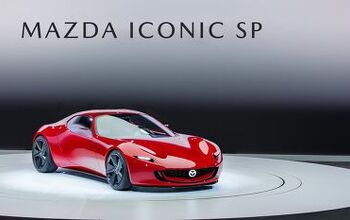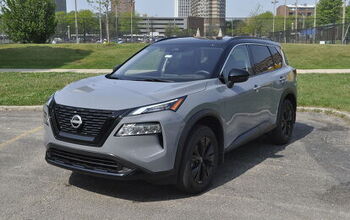QOTD: Is Your (Green) People's Car Already Here?

A reader linked me to an article last week that started off strong but went downhill near the end. I agree with the main thrust, though.
Mainly, that Elon Musk’s Tesla Model 3, in yet-unattainable base form, is wholly unnecessary. We’ll leave the company financials aside — Musk claims high-zoot Model 3s are necessary to keep the cash-burning company afloat, and there’s little reason to doubt it — and focus on the broader argument.
Electric cars are nice, but you don’t need one to save the planet.
Most of the public’s driving duties are easily accomplished by a plug-in hybrid with a Honda Clarity or Chevrolet Volt-type range, the author states, and this is certainly true. The vast majority of driving miles — commuting, running errands — can be handled with a vehicle that doesn’t entirely dispense with gasoline, but doesn’t need it for trips of roughly 50 miles.
If those trips suddenly went electric, we’d all be breathing easier, Mother Earth would smile (maybe less in areas with mineral extraction), and drivers could feel good about themselves. There’d also be gas left in the tank for those longer drives.
Last fall, while testing Hyundai’s all-electric Ioniq variant, I got to talking with a soon-to-be-retired man who lived with his wife in a downtown condo. Super keen on electrics, this man wanted a battery-powered vehicle as his next ride (his current car of choice was an entirely sensible Toyota Corolla). There’s a neat factor at work with EVs, sure. But the man’s wife didn’t want to spend her golden years figuring out the distance to the nearest public recharging station, nor did the idea of kiboshing certain road trips due to lack of infrastructure strike her as appealing. Also, no one wants to cool their heels next to a highway as a 240-volt connection slowly replenishes their battery’s juice.
My entirely predictable advice? “Get a Volt.” The husband would get his EV kick without sacrificing the range needed for a trip to Boston or Stowe or New York City, and his household would still end up about 90 percent gas-free.
Yes, it’s a pain to battle with the condo board for a hookup point in your urban parking spot, but outfitting an ordinary home with a Level 2 charger isn’t the Apollo 11 mission. You’ll just need to upgrade your breaker panel, probably, and run wire to the garage. Depending on a number of variables, it can be done for less than $1,000.
While the author of the piece advocates dumping the cost of electric vehicle charging infrastructure on every new home buyer and parking lot user, that’s simply not my policy cup of tea. Feel free to disagree on the urgency of the matter. What I do agree with, however, is that the base Model 3 — still months away from production — is only necessary for PR purposes. Consumers already have plenty of choice. It’s likely that more than a few $35,000 Model 3 reservation holders have taken notice.
What’s your take?
[Image: Kia Motors]

More by Steph Willems
Latest Car Reviews
Read moreLatest Product Reviews
Read moreRecent Comments
- 2ACL I'm pretty sure you've done at least one tC for UCOTD, Tim. I want to say that you've also done a first-gen xB. . .It's my idea of an urban trucklet, though the 2.4 is a potential oil burner. Would been interested in learning why it was totaled and why someone decided to save it.
- Akear You know I meant stock. Don't type when driving.
- JMII I may just be one person my wife's next vehicle (in 1 or 2 years) will likely be an EV. My brother just got a Tesla Model Y that he describes as a perfectly suitable "appliance". And before lumping us into some category take note I daily drive a 6.2l V8 manual RWD vehicle and my brother's other vehicles are two Porsches, one of which is a dedicated track car. I use the best tool for the job, and for most driving tasks an EV would checks all the boxes. Of course I'm not trying to tow my boat or drive two states away using one because that wouldn't be a good fit for the technology.
- Dwford What has the Stellantis merger done for the US market? Nothing. All we've gotten is the zero effort badge job Dodge Hornet, and the final death of the remaining passenger cars. I had expected we'd get Dodge and Chrysler versions of the Peugeots by now, especially since Peugeot was planning on returning to the US, so they must have been doing some engineering for it
- Analoggrotto Mercury Milan


































Comments
Join the conversation
"Electric cars are nice, but you don’t need one to save the planet." Your underlying premise - that EV buyers are a monolithic bunch of tree-huggers - is false. I like EVs for the instant torque, low- to near-zero maintenance, quieter ride, and substantially lower operating cost. Personally, I am unconcerned with GW, CG, ACG, or whatever the latest eco-panic is called. My only concern with EVs is depreciation. Rationally, there is no doubt that keeping an economy car in running order makes better sense from a microeconomic perspective. But car buying often isn't rational, which is easily observed in the volume of trucks sales in the US. If we're going to argue that the best green choice is to simply stick with economy cars, let's open the discussion to include all vehicle choices.
Absolutely. Replace the awd Escape Hybrid with an Outlander PHEV. The Mitsubishi has electric range for city use, battery capacity to recapture energy during long descents in the mountains, store/hold/discharge control, variable regeneration braking, and it can't possibly be less reliable than the Escape. The only downside is the Outlander's poorer gas-only mileage.